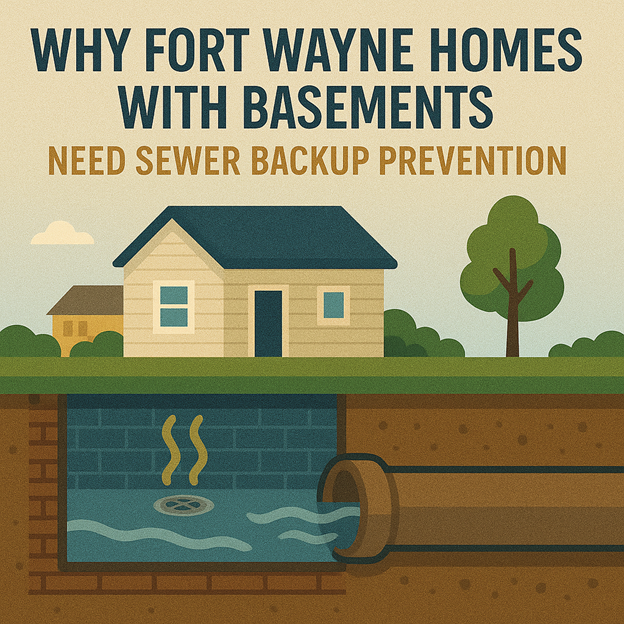Basements are a valuable asset in Fort Wayne homes — whether they’re finished family rooms, storage spaces, or utility hubs. But they also carry one of the most overlooked risks in residential plumbing: sewer backups. A sudden rush of wastewater into your basement can destroy valuables, damage drywall and flooring, invite mold, and cost thousands in repairs — all in a matter of minutes.
With Indiana’s increasing storm activity, aging underground infrastructure, and seasonal freeze-thaw cycles, it’s more important than ever for Fort Wayne homeowners to understand how and why to protect their basements from sewer backup. Prevention isn’t just protection — it’s peace of mind.
1. Why Basements Are Ground Zero for Sewer Backups
- Basements sit below the main sewer line elevation, making them the first area affected when sewer flow reverses or when blockages prevent proper drainage
- Gravity naturally directs water downward — meaning drains, toilets, and tubs in basements are the first to overflow when backpressure occurs
- Floor drains, sump pits, and below-grade bathrooms are often directly tied to the lateral sewer line without protective barriers
- Without intervention, even a short period of backflow can result in 2–3 inches of contaminated water pooling across a basement floor within hours
Key Risk Factors:
- Older homes with brittle clay, cast iron, or Orangeburg sewer pipes
- Properties on flat lots or at the bottom of sloped yards
- Basements with floor-level showers or toilets without check valves
- Heavy indoor water use paired with aging plumbing or poorly sloped lines
2. Common Causes of Basement Sewer Backups
- Tree root invasion: Common in Fort Wayne’s mature neighborhoods; roots infiltrate joints and block flow
- Clogged or collapsed pipes: Grease, wipes, or silt create obstructions that trap wastewater
- Storm overloads: Intense rainfall exceeds capacity of Fort Wayne’s combined sewer systems
- Pump failure: Sump pumps or ejector pumps malfunction due to wear, power outages, or improper sizing
- Cross-connected lines: Some older homes still have gutters or stormwater draining into the sewer line — a code violation and a high-risk scenario
3. Signs You’re at Risk
Even before flooding occurs, there are signs to watch for:
- Gurgling or bubbling in basement toilets, tubs, or utility sinks
- Slow drainage in multiple fixtures — especially during or after storms
- Persistent sewer odors near floor drains, walls, or storage areas
- Discoloration, watermarks, or mildew smells in corners of the basement
- Water reappearing in a cleaned drain trap, indicating pressure buildup
4. Proven Backup Prevention Strategies
Install a Backwater Valve:
- This simple mechanical device allows wastewater to exit your home but closes when flow reverses
- Prevents city sewage from entering your basement during surges
- Can be installed at the main sewer exit point or customized to protect specific rooms
- Needs periodic inspection to ensure proper functionality
Upgrade to a Sewage Ejector Pump:
- If you have basement toilets, showers, or washing machines, they likely rely on gravity-defying pumps
- A properly sized and sealed ejector pump ensures wastewater gets lifted into the mainline safely
- Modern units include alarms, airtight lids, and check valves for added protection
Floor Drain Protection:
- Add removable backflow preventers or one-way plugs to basement floor drains
- Keep water in traps by adding mineral oil (prevents evaporation)
- Clean sediment and hair regularly to avoid partial blockages
Regular Maintenance: Hydro Jetting & Camera Inspections
- Annual jetting clears sludge, grease, and early-stage root invasions
- Video inspections catch misaligned joints, cracks, or sagging pipe sections early
- Maintenance prevents emergencies and supports insurance claims
5. Fort Wayne’s Climate Makes It Worse
- Fort Wayne averages over 37 inches of annual precipitation, often concentrated in heavy summer downpours
- Freeze-thaw cycles during winter weaken underground pipes and increase vulnerability
- The city’s aging infrastructure, especially in pre-1970s neighborhoods, includes sections of combined sewer systems (CSOs), which are more likely to overflow
- Dense clay soil in the region retains moisture, creating hydrostatic pressure around foundations and increasing the risk of sewer intrusion
6. Why Insurance Is Not Enough
- Standard home insurance usually excludes sewer backup damage unless a specific rider or endorsement is purchased
- Even with coverage, claim caps are often low — ranging from $5,000 to $10,000, which may not cover new flooring, drywall, appliances, or mold remediation
- Insurance companies increasingly require proof of maintenance and preventive measures — having a backwater valve or inspection records can aid your claim
Bonus Tip: Check for a Sewer Cleanout Cap
- This access point is often overlooked — but it’s vital during emergencies
- A sealed cleanout cap prevents surges from escaping into your yard or basement
- Newer models include built-in pressure relief vents to release excess air or gas without allowing water to backflow
- If your cleanout is buried or missing its cap, contact a professional immediately
Fort Wayne Fact:
Neighborhoods like West Central, Southwood Park, and the ’05 area were largely developed before modern plumbing codes. Many homes still lack backflow prevention devices and have sewer laterals that are 50–70 years old — prime conditions for backups.
Protect the Lowest Point in Your Home — Before It’s Too Late
Your basement should be a bonus — not a burden. With modern technology and proactive maintenance, sewer backups are not just preventable — they’re avoidable. Fort Wayne’s unique soil, tree coverage, and aging systems demand extra vigilance. Whether it’s a floor drain check or a full sewer line replacement, AAA Sewer Service has your back.
📞 Call AAA Sewer Service at (260) 456-6930
🌐 Visit our website: www.aaasewerservice.com

